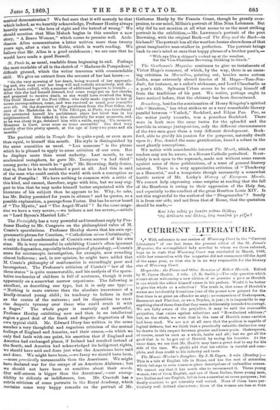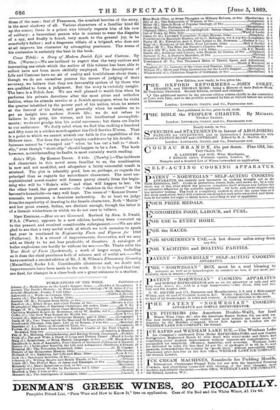CURRENT LITERATURE.
• „• With reference to our review of Waverney Court in the " Current Literature" of our last issue, the present editor of the St. James's Mogazine, the accomplished lady novelist to whom we there referred, bogs us to state that Waverney Court was concluded in March, 1868, while her connection with the magazine did not commence till the April of the same year, so that she is in no way responsible for the literary sins of fl'averney Court.
Hesperides: the Poems and Other Remains of Robert Herricle. Edited by W. Carew Hazlitt. 2 vole. (J. It. Smith.)—The only question which occurs about welcoming a new edition of so genuine a poet as Herrick is one which tho editor himself raises in his preface. Would it be better to give the whole or a selection ? The truth is, that some of Herrick's versos are intolerably li cautious (one of the poems now printed for the first time is as great an offender as any); no comparison of Shakespeare, Beaumont and Fletcher, or even Dryden, is just ; it is impossible to say anything else of them than that they seem deliberately intended to corrupt. We are fully aware of the prejudice, it may be said the reasonable prejudice, that exists against selections and " Bowdlerized editions ;" but, on the whole, we wish that in the case of Herrick some excision had been used. We are not at all sure that the position is capable of logical defence, but wo think that a practically valuable distinction may be drawn in this respect botweon greater and lessor poets. Shakespeare, of course, must be soon as a whole, faults and all ; but we get all the good that is to bo got out of Herrick by seeing his beauties. At the same time, we see that Mr. Hezlat may have a great deal to say for his side of the case. We gladly add that his edition is careful and complete, and does credit to his industry and taste.
The MosaicWorker's Daughter. By J. M. Capes. 3 vela. (Bentley.)— This is a tale of English life in Rome, and has the sort of attraction which belong& to even common-place descriptions of unfamiliar scenes. We cannot say that it has much else to recommend it. Three young women, two of them English, and one of thorn Italian, three young mon, two Italian and one English, fall in love somewhat at cross-purposes; but finally contrive to get tolerably well sorted. None of them have particularly well defined characters ; those of the women are less so than those of the men ; that of Francesca, the nominal heroine of the story, is the most shadowy of all. Various characters of a familiar kind fill up the scene; there is a priest who bitterly repents him of his vow of celibacy ; a benevolent person who in content to wear the disguise of a spy, and finally is found, very much to the general joy, to be somebody's father ; and a desperate villain of a brigand, who does not at all improve his character by attempting penitence. The scene of his confession is certainly the best in the book.
Count Teleki : a Story of Modern Jewish Life and Customs. By Eke. (Warne.)—We are inclined to regret that the very curious and interesting materials which the author of this volume has been able to collect have not been more skilfully employed. The descriptions of Life and Customs have an air of reality and truthfulness about them ; though we do not ourselves possess the means of judging of their accuracy, we believe that they are favourably spoken of by those who are qualified to form a judgment. But the story is certainly naught. The hero is a Polish Jew. We are well pleased to watch him when he performs his private devotions after the most pious and orthodox fashion, when he attends service at a Jewish synagogue, when he visits the quarter inhabited by the poorer part of his nation, when he assists at the funeral of his father, and generally when he enables us to get an insight into modern Jewish life ; we do not refuse to believe in his piety, his virtues, and his intellectual accomplishments ; we do not grudge him his social successes ; but there are limits to our endurance. We flatly rebel when we find him making a hundred and fifty runs in a cricket match against the Civil Service Eleven. That is a point to which we cannot stretch our faith in the capabilities of the Hebrew race. Nor does the author inspire confidence by his details. A batsman cannot be "stumped out" when he has cut a ball to "shortslip," even though "short-slip" should happen to be a Jew. The book however, notwithstanding its faults, is most certainly worth reading.
Roke's Wife. By Kenner Deena. 3 vols. (Newby.)—The incidents and characters in this novel seem familiar to us, the combination is new and not unskilful, and altogether a fairly successful result is attained. The plot is tolerably good, less so, perhaps, as regards the principal than as regards the subordinate characters. The most un sophisticated novel-reader will foresee pretty clearly from the beginning who will be " Roke's wife " and what will happen to her. On the other hand, the great secret—the "skeleton in the closet" in the baronet's household—is very well kept. The name of " Kenner Deane " conceals, we presume, a feminine authorship. So at least we judge from the superiority of drawing in the female characters. Both " Mettle " and her great enemy, Selina, are distinct enough, though the latter is of a Satanic wickedness in which we do not care to believe.
Naw EDMONS.—Rote we are Governed. Revised by Alex. S. Ewald, F.S.A. (Warne), appears in a new edition, having been corrected up to the present and received considerable enlargement.—We are also glad to see that a very useful work of which we took occasion to speak last year is continued in Engineering Facts and Figures for 1868 (Fullerton). It is a record of improvements, discoveries, and we may add, as likely to be not less profitable, of disasters. A catalogue of boiler explosions can hardly be without its use.—Mr. Timbs edits the Year Book of Facts (Lockwood), a work of larger scope, including as it does the chief provinces both of science and of useful art.—We have received a second edition of Mr. J. M. Wilson's Elementary Geometry (Macmillan), Books 1-3. Considerable alterations and, we doubt not, improvements have been made in the work. It is to bo hoped that they are final, for changes in a class-book are a great nuisance to a teacher.































 Previous page
Previous page